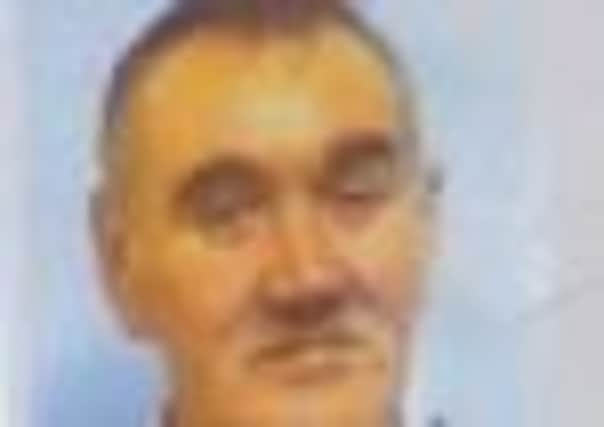New probe into mystery death near Ikea


The Evening News understands that a new probe could be launched into the mystery death of army veteran Edward Dooley, who was discovered unconscious on a pavement in Straiton near Ikea in October 2008. The 54-year-old was rushed to hospital after being discovered by a taxi driver at 11.30pm but died two days later.
The death was investigated by police but Mr Dooley’s family were told that it would remain unexplained, after it was ruled that no conclusive evidence of an assault had been found. In a further twist, two men were charged with attempting to pervert the course of justice in 2009 in connection with the death but it is understood the case was dropped.
Advertisement
Hide AdAdvertisement
Hide AdMr Dooley’s family refused to accept the official findings. They obtained the post-mortem and forensic reports and had them examined privately by their own medical and legal teams.
They say they uncovered discrepancies in the documents and are now convinced he was killed in a vicious attack.
The Evening News has learned that the Crown Office added the case to its “unresolved cases database” earlier this month. However, neither prosecutors nor police will comment on the move.
Reacting to the development, Mr Dooley’s son, James Dooley, said: “The private teams found quite serious inaccuracies.
“The process seemed chaotic and shabby. It’s made us really angry. Someone could have been getting away with murder.
“My father was a law-abiding citizen – an absolute gentleman and a real family man. That someone could hurt him is almost beyond belief but I do believe he was murdered.”
The family say that in the post-mortem report, the date on which the examination was carried out was incorrect, as was information surrounding the identification of Mr Dooley’s body. A blood sample was also said to have been incorrectly labelled.
The private medical team said injuries which were referenced in the post-mortem, including two skull fractures, a dislocated shoulder, a broken rib and various bruises to Mr Dooley’s body and face, were consistent with a serious assault or being struck by a vehicle.
Advertisement
Hide AdAdvertisement
Hide AdFollowing Mr Dooley’s death, police ruled out the possibility that he had been involved in a road accident.
Mr Dooley’s family claim the reports focused too heavily on a head injury he sustained and did not examine his other injuries closely enough.
Following the death of Mr Dooley, on October 27, 2008, his body was kept for five months before it was released to the family.
James, 35, who works in psychiatric services for NHS Lothian and lives in Stockbridge, added: “We were never given any answers to the questions we have put to the Crown Office. This raises questions not just about my father’s death, but about other unexplained deaths where the family may not have the resources to pursue these matters privately.”
Mr Dooley, who was working as a security guard at the Royal Edinburgh Hospital at the time of his death, had taken his eldest granddaughter to the cinema and watched High School Musical with her on the day that he suffered the fatal injuries.
After dropping her off, Mr Dooley met friends in a pub in Newington and left telling them he was going to get a bus to his home in Myrtle Crescent, Bilston, before tragedy struck.
His two grandchildren, aged ten and seven at the time, were left distraught by Mr Dooley’s death and took years to get over the trauma. His ex-wife Margaret, to whom Mr Dooley remained close, died in 2010.
Previously, Mr Dooley had worked for almost 30 years as an engineer for Scottish Water, after he left the army in 1976.
Advertisement
Hide AdAdvertisement
Hide AdHe served with the Royal Scots Guards, in a six-year stint which included spells in Northern Ireland, Cyprus, Turkey and Germany.
The Crown Office refused to say whether the case was being investigated as a murder, with a spokeswoman only saying: “The case is still active”. Lothian and Borders Police declined to comment.
THE death of Edward Dooley could be investigated by a specialist team set up to investigate historic crimes.
A national Cold Case unit was set up by the Crown Office last year in a bid to track down killers who had escaped justice.
Then, 93 unsolved killings from across Scotland were lodged on the unresolved homicide database, which brings together information provided by police forces to help identify cases that could be cracked through advances in evidence gathering techniques such as DNA profiling.
Suspected murders from between 1942 and 2008 were recorded.
The Crown Office did not reveal whether any Lothian cases were on the list, and have refused to say whether the death of Mr Dooley is to be added to the database.
But other cases which the team may investigate include the murder of city businessman David McMenigall, whose body was found at his rented Glasgwow Road bungalow, pictured below, on February 24, 1966. The 52-year-old was found dead in his home by his housekeeper, having suffered head injuries, his Mark 10 Jaguar still parked outside.
Another murder that remains a mystery is that of Catherine Duncan, a 46-year-old who was found dead in her council flat in Wallyford, East Lothian, on February 2, 1968.
Advertisement
Hide AdAdvertisement
Hide AdMrs Duncan had been out playing bingo in the Miners Bowling Club in Wallyford on the previous evening with her 53-year-old husband, Tom, who discovered her stabbed to death at 6.30am the next day after he returned from his night shift as a miner at Smeaton Colliery.
In a further case, the partially-clothed body of the housewife Helen Kane, pictured above, was found on a hillside overlooking Holyrood Park on May 25, 1970.
She was discovered in a shallow building site excavation south of the Pleasance by a man walking his dog.